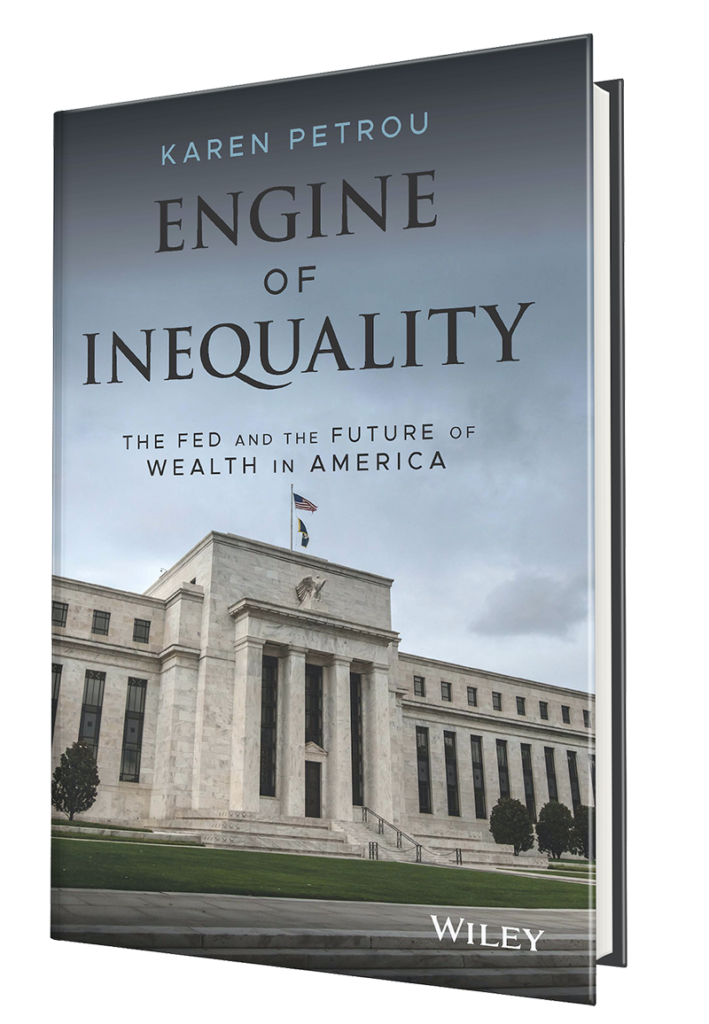Our Services
Engine of Inequality, by Karen Petrou
The first book to reveal how the Federal Reserve holds the key to making us more economically equal, written by an author with unparalleled expertise in the real world of financial policy.
Following the 2008 financial crisis, the Federal Reserve’s monetary policy placed much greater focus on stabilizing the market than on helping struggling Americans. As a result, the richest Americans got a lot richer while the middle class shrank and economic and wealth inequality skyrocketed. In Engine of Inequality, Karen Petrou offers pragmatic solutions for creating more inclusive monetary policy and equality-enhancing financial regulation as quickly and painlessly as possible.
Coming soon, preorder your copy now.
“Petrou’s book uncovers a hidden engine of our skyrocketing inequality: financial-policy. In an accessible and engaging prose, Petrou takes us through the inner workings of monetary policy at the Fed and financial regulations, how they’ve made inequality worse and how they could instead be retooled to take us to a more equitable future. A novel look at the problem of inequality and bold ideas to help resolve it. A must read.”—Emmanuel Saez, Professor of Economics at the University of California Berkeley and author of The Triumph of Injustice
Read full description and reviews.

Industry Expert
Federal Financial Analytics (FedFin) is a Washington-based financial services-consulting firm that has for decades attracted a high-powered clientele in Washington, on Wall Street, and among global central bankers. Since 1985 FedFin has provided a unique blend of analysis and strategic advice on public policy, regulatory, and legislative issues for industry and governmental clients doing business in the U.S. and abroad.
A proprietary think-tank for its clients, FedFin reviews critical federal and global policy developments in banking, insurance, asset management, and mortgage finance, analyzes them in great depth, and then advises clients on whether what they want can be made to work for them, within the policy environment and for the financial system. It is FedFin’s guiding principle to be an honest broker, and clients depend on the fact that the firm does not offer lobbying or any other services that could compromise its objectivity and independence.
As seen In:
In the News
Marketplace, Wednesday, April 11, 2024
What do bank earnings tell us about the economy? By Mitchell Hartman It’s the second week of April, which means spring is in the air and daffodils, cherry trees and lilacs are blooming. Here at Marketplace, it also means earnings season is starting. Corporate profit-and-loss reports for the January-to-March quarter kicked [...]
Marketplace, Friday, April 5, 2024
When is strong hiring too strong? by David Brancaccio Hiring in the month that just ended was quite a bit stronger than expected, with more than 300,000 jobs added to payrolls and the unemployment rate falling slightly to 3.8%. That’s continuing the Fed’s interest rate predicament. We’ll discuss with Karen Petrou, [...]
American Banker, Podcast, April 4, 2025
Buy the People: Why everyone loves to hate the Fed By Kyle Campbell Click the link below to listen to Kyle Campbell's podcast on economic populism. It’s a terrific survey of Fed history with authoritative insiders including Federal Financial Analytics' managing partner Karen Petrou, and then – my bit – [...]
Issues in Focus
October 26, 2020: FedFin Issues Brief: Going Green: The Future of U.S. Climate Risk Financial Policy
June 25, 2019: FedFin Policy Paper: Do Credit Unions Truly Advance Economic Equality?
The Vault
Karen Petrou: The FDIC Plan to End Too-Big-to-Fail Brings Promise of More Bailouts
In 2013, the FDIC issued a short, unilluminating paper purporting to show how the agency would implement one aspect of the orderly-liquidation authority (OLA) Congress granted in 2010 to prevent the profligate bailouts that blighted the great financial crisis. I was unconvinced by the 2013 paper and even more perplexed when years passed and the utterance on single-point-of-entry (SPOE) resolutions was all the FDIC deigned to pronounce. After all, if [...]
FedFin Assessment: FDIC Plan to Resolve GSIBs Fails to Answer Many Key Questions
In its first public statement since 2013 about how it would execute an SPOE resolution (see FSM Report RESOLVE23), the FDIC yesterday released a report Chair Gruenberg described as demonstrating the FDIC’s readiness to resolve a U.S. GSIB and the process it has developed for doing so under the orderly liquidation authority (OLA) provided in the Dodd-Frank Act (see FSM Report SYSTEMIC30). As detailed in this FedFin report, the FDIC’s goal is to set stakeholder expectations [...]
Karen Petrou: Why Lowering Interest Rates Now Makes Housing Even More Unaffordable
As we’ve noted, Sen. Warren and a raft of progressive Democrats are emphatically demanding that the Federal Reserve lower interest rates to promote affordable housing. However, as a new Federal Reserve Bank of Dallas note confirms, low rates don’t necessarily make it easier to buy a home because house prices generally rise as rates fall. Worse still, ultra-low real rates eviscerate not just the ability of all but the well-heeled [...]



